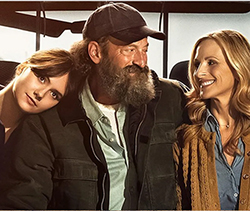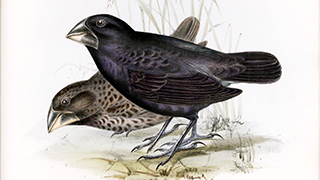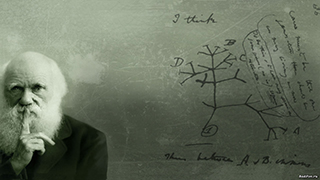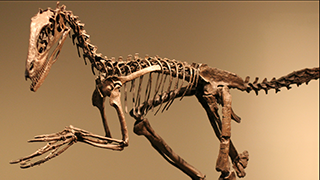MENU
The Electronic Scholarly Publishing Project: Providing access to classic scientific papers and other scholarly materials, since 1993. More About: ESP | OUR CONTENT | THIS WEBSITE | WHAT'S NEW | WHAT'S HOT
Comparative Timelines
The ESP Timeline (one of the site's most popular features) has been completely updated to allow the user to select (using the timeline controls above each column) different topics for the left and right sides of the display.
Select:
New Left Column
New Left Column
Dates
Decade
New Right Column
New Right Column
 Nomadland wins Academy Award for best picture. Nomadland is a 2020 American drama film written, produced, edited and directed by Chloé Zhao. Based on the 2017 nonfiction book Nomadland: Surviving America in the Twenty-First Century by Jessica Bruder, it stars Frances McDormand as a widow who leaves her life in Nevada to travel around the United States in her van as a nomad. A number of real-life nomads appear as fictionalized versions of themselves, including Linda May, Swankie, and Bob Wells. David Strathairn also stars in a supporting role. Nomadland premiered on September 11, 2020, at the Venice Film Festival, where it won the Golden Lion. It also won the People's Choice Award at the Toronto International Film Festival. It had a one-week streaming limited release on December 4, 2020, and was distributed by Searchlight Pictures in selected IMAX theaters in the United States on January 29, 2021, and simultaneously in theaters, and streaming digitally on Hulu, on February 19, 2021. The film received widespread critical acclaim and was a box office success, grossing $39 million worldwide against its $5 million budget. At the 93rd Academy Awards, the film won Best Picture, Best Director, and Best Actress for McDormand, from a total of six nominations. Zhao became the first Asian woman and the second woman ever to win Best Director; McDormand became the first woman and fourth person to win Academy Awards for both acting and producing, and the first person ever to win Academy Awards as producer and performer for the same film.
Nomadland wins Academy Award for best picture. Nomadland is a 2020 American drama film written, produced, edited and directed by Chloé Zhao. Based on the 2017 nonfiction book Nomadland: Surviving America in the Twenty-First Century by Jessica Bruder, it stars Frances McDormand as a widow who leaves her life in Nevada to travel around the United States in her van as a nomad. A number of real-life nomads appear as fictionalized versions of themselves, including Linda May, Swankie, and Bob Wells. David Strathairn also stars in a supporting role. Nomadland premiered on September 11, 2020, at the Venice Film Festival, where it won the Golden Lion. It also won the People's Choice Award at the Toronto International Film Festival. It had a one-week streaming limited release on December 4, 2020, and was distributed by Searchlight Pictures in selected IMAX theaters in the United States on January 29, 2021, and simultaneously in theaters, and streaming digitally on Hulu, on February 19, 2021. The film received widespread critical acclaim and was a box office success, grossing $39 million worldwide against its $5 million budget. At the 93rd Academy Awards, the film won Best Picture, Best Director, and Best Actress for McDormand, from a total of six nominations. Zhao became the first Asian woman and the second woman ever to win Best Director; McDormand became the first woman and fourth person to win Academy Awards for both acting and producing, and the first person ever to win Academy Awards as producer and performer for the same film.
2020
(no entry for this year)
 CODA wins Academy Award for best picture. CODA is a 2021 coming-of-age comedy-drama film written and directed by Sian Heder. An English-language remake of the 2014 French-Belgian film La Famille Bélier, it stars Emilia Jones as Ruby Rossi, the child of deaf adults (CODA) and only hearing member of her family, who attempts to help her family's struggling fishing business while pursuing her aspirations to become a singer. The movie uses deaf actors to play the deaf characters, who, along with Jones, communicate using American Sign Language. Eugenio Derbez, Troy Kotsur, Ferdia Walsh-Peelo, Daniel Durant (in his feature film debut), and Marlee Matlin are featured in supporting roles. An international co-production between the United States and France, with Philippe Rousselet of La Famille Bélier reprising his role as producer, it was filmed on location in Gloucester, Massachusetts, in the United States. CODA had its world premiere on January 28, 2021, at the 2021 Sundance Film Festival, where Apple acquired its distribution rights for a festival-record $25 million. The film was released through the Apple TV+ streaming service on August 13, 2021. It received largely positive reviews from critics, who praised Heder's screenplay and Kotsur's performance, although feedback from deaf viewers was polarized. It was named one of the top 10 films of 2021 by the American Film Institute and has since been cited as among the best films of the 2020s. CODA won numerous awards, including all three nominations at the 94th Academy Awards — Best Picture, Best Supporting Actor for Kotsur, and Best Adapted Screenplay, becoming the seventh Best Picture winner to win every award for which it was nominated.
CODA wins Academy Award for best picture. CODA is a 2021 coming-of-age comedy-drama film written and directed by Sian Heder. An English-language remake of the 2014 French-Belgian film La Famille Bélier, it stars Emilia Jones as Ruby Rossi, the child of deaf adults (CODA) and only hearing member of her family, who attempts to help her family's struggling fishing business while pursuing her aspirations to become a singer. The movie uses deaf actors to play the deaf characters, who, along with Jones, communicate using American Sign Language. Eugenio Derbez, Troy Kotsur, Ferdia Walsh-Peelo, Daniel Durant (in his feature film debut), and Marlee Matlin are featured in supporting roles. An international co-production between the United States and France, with Philippe Rousselet of La Famille Bélier reprising his role as producer, it was filmed on location in Gloucester, Massachusetts, in the United States. CODA had its world premiere on January 28, 2021, at the 2021 Sundance Film Festival, where Apple acquired its distribution rights for a festival-record $25 million. The film was released through the Apple TV+ streaming service on August 13, 2021. It received largely positive reviews from critics, who praised Heder's screenplay and Kotsur's performance, although feedback from deaf viewers was polarized. It was named one of the top 10 films of 2021 by the American Film Institute and has since been cited as among the best films of the 2020s. CODA won numerous awards, including all three nominations at the 94th Academy Awards — Best Picture, Best Supporting Actor for Kotsur, and Best Adapted Screenplay, becoming the seventh Best Picture winner to win every award for which it was nominated.
2021
(no entry for this year)
 Everything Everywhere All at Once wins Academy Award for best picture. Everything Everywhere All at Once is a 2022 American absurdist comedy-drama film written and directed by Daniel Kwan and Daniel Scheinert, who produced it with Anthony and Joe Russo and Jonathan Wang. The film incorporates elements from several genres and film media, including surreal comedy, science fiction, fantasy, martial arts films, immigrant narrative, and animation. Michelle Yeoh stars as Evelyn Quan Wang, a Chinese-American immigrant who, while audited by the IRS, discovers that she must connect with parallel universe versions of herself to prevent a powerful being from destroying the multiverse. The film also stars Stephanie Hsu, Ke Huy Quan, Jamie Lee Curtis, and James Hong. Everything Everywhere All at Once premiered at South by Southwest on March 11, 2022, and began a limited theatrical release in the United States on March 25, before a wide release by A24 on April 8. Grossing $143.4 million worldwide on a $14.3–25 million production budget, it became A24's highest-grossing film and garnered universal acclaim. At the 95th Academy Awards, it won seven out of the eleven awards it was nominated for: Best Picture, Best Actress (Yeoh), Best Supporting Actor (Quan), Best Supporting Actress (Curtis), Best Director and Best Original Screenplay for Kwan and Scheinert, and Best Editing.
Everything Everywhere All at Once wins Academy Award for best picture. Everything Everywhere All at Once is a 2022 American absurdist comedy-drama film written and directed by Daniel Kwan and Daniel Scheinert, who produced it with Anthony and Joe Russo and Jonathan Wang. The film incorporates elements from several genres and film media, including surreal comedy, science fiction, fantasy, martial arts films, immigrant narrative, and animation. Michelle Yeoh stars as Evelyn Quan Wang, a Chinese-American immigrant who, while audited by the IRS, discovers that she must connect with parallel universe versions of herself to prevent a powerful being from destroying the multiverse. The film also stars Stephanie Hsu, Ke Huy Quan, Jamie Lee Curtis, and James Hong. Everything Everywhere All at Once premiered at South by Southwest on March 11, 2022, and began a limited theatrical release in the United States on March 25, before a wide release by A24 on April 8. Grossing $143.4 million worldwide on a $14.3–25 million production budget, it became A24's highest-grossing film and garnered universal acclaim. At the 95th Academy Awards, it won seven out of the eleven awards it was nominated for: Best Picture, Best Actress (Yeoh), Best Supporting Actor (Quan), Best Supporting Actress (Curtis), Best Director and Best Original Screenplay for Kwan and Scheinert, and Best Editing.
2022
(no entry for this year)
 Oppenheimer wins Academy Award for best picture. Oppenheimer is a 2023 epic biographical thriller drama film written, directed, and produced by Christopher Nolan. It follows the life of J. Robert Oppenheimer, the American theoretical physicist who helped develop the first nuclear weapons during World War II. Based on the 2005 biography American Prometheus by Kai Bird and Martin J. Sherwin, the film chronicles Oppenheimer's studies, his direction of the Los Alamos Laboratory and his 1954 security hearing. Cillian Murphy stars as Oppenheimer, alongside Robert Downey Jr. as the United States Atomic Energy Commission member Lewis Strauss. The ensemble supporting cast includes Emily Blunt, Matt Damon, Florence Pugh, Josh Hartnett, Casey Affleck, Rami Malek, and Kenneth Branagh. Oppenheimer premiered at Le Grand Rex in Paris on July 11, 2023, and was theatrically released in the United States and the United Kingdom on July 21 by Universal Pictures. Its concurrent release with Warner Bros.'s Barbie was the catalyst of the "Barbenheimer" phenomenon, encouraging audiences to see both films as a double feature. Oppenheimer grossed over $977 million worldwide, becoming the third-highest-grossing film of 2023, the highest-grossing World War II-related film, the highest-grossing biographical film and the third-highest-grossing R-rated film. The recipient of many accolades, Oppenheimer won seven Academy Awards, including Best Picture, Best Director for Nolan, Best Actor for Murphy and Best Supporting Actor for Downey. It also won five Golden Globe Awards (including Best Motion Picture – Drama) and seven British Academy Film Awards (including Best Film), and was named one of the top ten films of 2023 by the National Board of Review and the American Film Institute.
Oppenheimer wins Academy Award for best picture. Oppenheimer is a 2023 epic biographical thriller drama film written, directed, and produced by Christopher Nolan. It follows the life of J. Robert Oppenheimer, the American theoretical physicist who helped develop the first nuclear weapons during World War II. Based on the 2005 biography American Prometheus by Kai Bird and Martin J. Sherwin, the film chronicles Oppenheimer's studies, his direction of the Los Alamos Laboratory and his 1954 security hearing. Cillian Murphy stars as Oppenheimer, alongside Robert Downey Jr. as the United States Atomic Energy Commission member Lewis Strauss. The ensemble supporting cast includes Emily Blunt, Matt Damon, Florence Pugh, Josh Hartnett, Casey Affleck, Rami Malek, and Kenneth Branagh. Oppenheimer premiered at Le Grand Rex in Paris on July 11, 2023, and was theatrically released in the United States and the United Kingdom on July 21 by Universal Pictures. Its concurrent release with Warner Bros.'s Barbie was the catalyst of the "Barbenheimer" phenomenon, encouraging audiences to see both films as a double feature. Oppenheimer grossed over $977 million worldwide, becoming the third-highest-grossing film of 2023, the highest-grossing World War II-related film, the highest-grossing biographical film and the third-highest-grossing R-rated film. The recipient of many accolades, Oppenheimer won seven Academy Awards, including Best Picture, Best Director for Nolan, Best Actor for Murphy and Best Supporting Actor for Downey. It also won five Golden Globe Awards (including Best Motion Picture – Drama) and seven British Academy Film Awards (including Best Film), and was named one of the top ten films of 2023 by the National Board of Review and the American Film Institute.
2023
(no entry for this year)
(no entry for this year)
2024
(no entry for this year)
(no entry for this year)
2025
(no entry for this year)
(no entry for this year)
2026
(no entry for this year)
(no entry for this year)
2027
(no entry for this year)
(no entry for this year)
2028
(no entry for this year)
(no entry for this year)
2029
(no entry for this year)
ESP Quick Facts
ESP Origins
In the early 1990's, Robert Robbins was a faculty member at Johns Hopkins, where he directed the informatics core of GDB — the human gene-mapping database of the international human genome project. To share papers with colleagues around the world, he set up a small paper-sharing section on his personal web page. This small project evolved into The Electronic Scholarly Publishing Project.
ESP Support
In 1995, Robbins became the VP/IT of the Fred Hutchinson Cancer Research Center in Seattle, WA. Soon after arriving in Seattle, Robbins secured funding, through the ELSI component of the US Human Genome Project, to create the original ESP.ORG web site, with the formal goal of providing free, world-wide access to the literature of classical genetics.
ESP Rationale
Although the methods of molecular biology can seem almost magical to the uninitiated, the original techniques of classical genetics are readily appreciated by one and all: cross individuals that differ in some inherited trait, collect all of the progeny, score their attributes, and propose mechanisms to explain the patterns of inheritance observed.
ESP Goal
In reading the early works of classical genetics, one is drawn, almost inexorably, into ever more complex models, until molecular explanations begin to seem both necessary and natural. At that point, the tools for understanding genome research are at hand. Assisting readers reach this point was the original goal of The Electronic Scholarly Publishing Project.
ESP Usage
Usage of the site grew rapidly and has remained high. Faculty began to use the site for their assigned readings. Other on-line publishers, ranging from The New York Times to Nature referenced ESP materials in their own publications. Nobel laureates (e.g., Joshua Lederberg) regularly used the site and even wrote to suggest changes and improvements.
ESP Content
When the site began, no journals were making their early content available in digital format. As a result, ESP was obliged to digitize classic literature before it could be made available. For many important papers — such as Mendel's original paper or the first genetic map — ESP had to produce entirely new typeset versions of the works, if they were to be available in a high-quality format.
ESP Help
Early support from the DOE component of the Human Genome Project was critically important for getting the ESP project on a firm foundation. Since that funding ended (nearly 20 years ago), the project has been operated as a purely volunteer effort. Anyone wishing to assist in these efforts should send an email to Robbins.
ESP Plans
With the development of methods for adding typeset side notes to PDF files, the ESP project now plans to add annotated versions of some classical papers to its holdings. We also plan to add new reference and pedagogical material. We have already started providing regularly updated, comprehensive bibliographies to the ESP.ORG site.
ESP Picks from Around the Web (updated 06 MAR 2017 )
Old Science

Weird Science

Treating Disease with Fecal Transplantation
Fossils of miniature humans (hobbits) discovered in Indonesia

Dinosaur tail, complete with feathers, found preserved in amber.
Astronomy

Mysterious fast radio burst (FRB) detected in the distant universe.